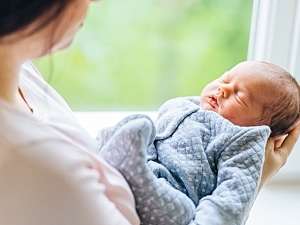During the postpartum period, the convergence of psychological, social and physiological changes increases women’s vulnerability to the onset or exacerbation of mental health problems. It’s been established that depression during this period can lead to difficulties in maternal–infant bonding.
In a nationwide online survey of pregnant and postpartum women, Cindy H. Liu, PhD, director of the Developmental Risk and Cultural Resilience Laboratory at Brigham and Women’s Hospital, Carmina Erdei, MD, director of the NICU Growth and Development Unit at the Brigham, and colleagues determined that psychological factors related to COVID-19, particularly grief, pose unique hazards to mother–infant bonding. Their report appears in Pediatric Research.
Methods
The ongoing PEACE Study (Perinatal Experiences And COVID-19 Effects) at the Brigham was launched in May 2020. Adult women in the U.S. are recruited to complete an online survey if they are at least 13 weeks pregnant or gave birth to a live baby in the past six months.
This analysis included 429 women who participated in wave 1 of the survey, conducted between May 19 and August 17, 2020. Participants answered questions about:
- COVID-19-related health—Four items from the Coronavirus Health Impact Survey (CRISIS) assessing worry about COVID-19 affecting one’s physical and mental health, and the health of family and friends
- Grief—Three items that captured emotions related to COVID-19, such as feeling stunned or dazed over what has happened, feeling that life is empty and feeling bitter over the loss of daily activities; three items about missing out on celebrating major life events, losing the support of family and friends due to social distancing or losing vital resources (e.g., housing, mentorship, food access); and one item assessing any sad feelings over being unable to fully celebrate the pregnancy and/or birth of the child with loved ones
- Depressive symptoms over the past seven days—The 20-item Center for Epidemiologic Studies–Depression self-report measure
- Anxiety symptoms—The Generalized Anxiety Disorder Scale–7
- Maternal self-efficacy—The 10-item Maternal Self-Efficacy Scale (MSES), which assesses the mother’s belief or confidence in completing specific infant care tasks
- Mother–infant bonding—The Maternal Postpartum Attachment Scale (MPAS): nine items in which respondents rate their confidence and satisfaction about interacting with the infant, five items about hostile feelings or anger toward the infant, and five items about the desire for physical closeness with the infant and joy in interacting
Characteristics of the Sample
The mean age of the cohort was 34. The vast majority of women were white (91%) and had at least a college degree (93%). 51% had a household income ≥$150,000/year. 40% were reporting on their first pregnancy. The average infant age was 12.6 weeks.
Predictors of Maternal Bonding
Variables associated with lower levels of maternal–infant bonding were:
- Higher levels of depressive symptoms (β, −0.376)
- Higher levels of grief about COVID-19 (β, −0.095)
- Infant age (β, −0.157)
- Household income >$225,000 compared with <$75,000 (β, −0.091)
- Holding a postgraduate degree compared with having less than a college education (β, −0.166)
Variables associated with higher levels of maternal–infant bonding were:
- First pregnancy (β, 0.105)
- Higher levels of health worries about COVID-19 (β, 0.093)
- Higher levels of maternal self-efficacy (β, 0.480)
Anxiety symptoms and social support were not significantly associated with mother–infant bonding.
Suggested Interventions
In light of these findings, specific considerations for clinicians are to:
- Screen for postpartum depression at the one-, two-, four- and six-month well-child visits. The American Academy of Pediatrics recommended serial screening in 2019, and screening is even more important during the COVID-19 pandemic when vulnerable populations are at increased risk of stress contagion
- Provide dyadic interventions aimed to increase maternal self-efficacy and confidence in parenting skills. Examples include encouraging meaningful interactions between mothers and infants, coaching mothers on reading infant cues and enhancing their responsivity skills
- Assess the COVID-19-related health and grief concerns each family is experiencing and provide resources if needed
Notably, this study suggests worry about the infant doesn’t necessarily increase the risk of poor bonding. Still, being overly preoccupied with COVID-19 might limit a woman’s ability to connect with her infant over a longer term.
